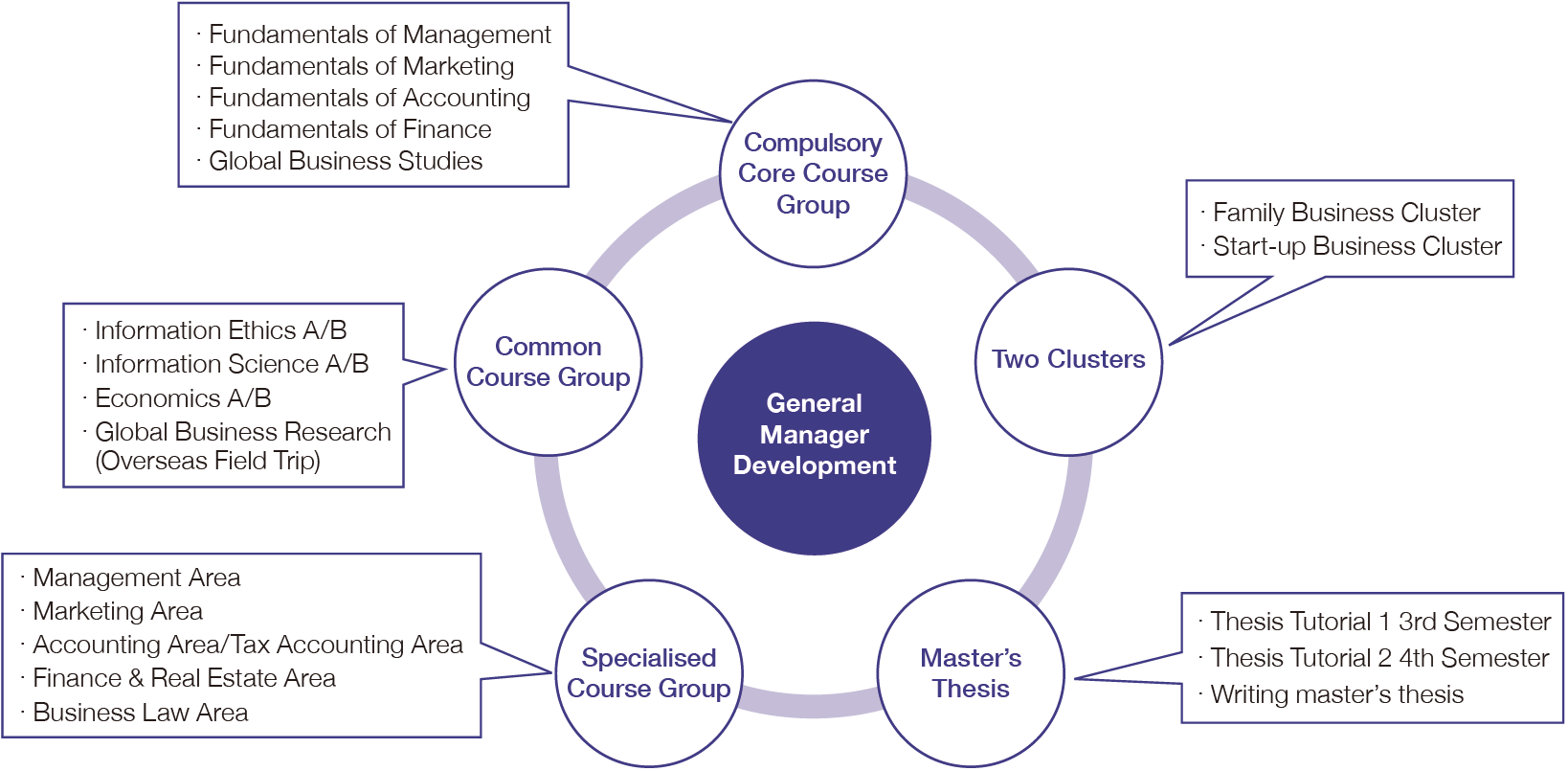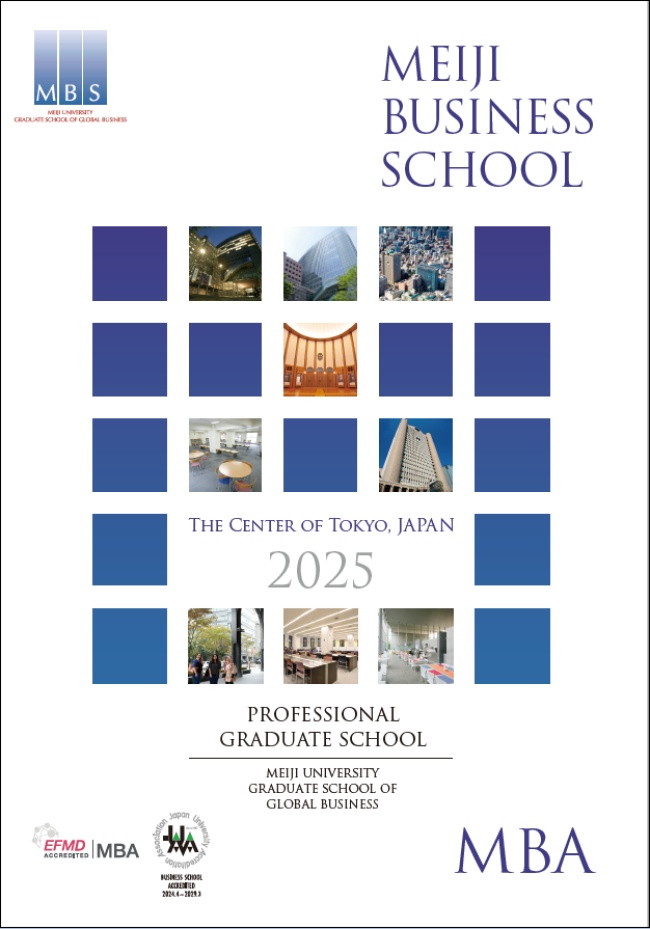- Two Clusters (Family Business Cluster & Start-up Business Cluster)
- Courses Taught in English, 2024
- Brochure Download
- Syllabus
- MBS Curriculum Policy
- MBS Diploma Policy
The compulsory core courses group develops the wide range of fundamental knowledge and skills in management that a general manager should possess, and builds a solid foundation in order to take specialised courses. Students must take 10 credits from the courses below until graduation.
The common course group includes courses on quantitative, institutional, and behavioral analytical methods, with the aim of fostering knowledge that is commonly needed in all academic areas. This also includes Global Business Research (Overseas Field Trips) in which MBS students visit overseas business schools and local companies.
The specialised course group is set to learn new knowledge and skills necessary for future corporate management and operations, as well as to advance specialised knowledge and skills in 5 areas. With practical learnings and case studies, students develop professional insight in a specialised area while cultivating abilities to identify and solve problems. We also offer around 60 courses taught in English for enhancing English proficiency in business scene.
Students are required to pass the examination on master’s theses for the MBA degree. They write their theses as a culmination of the study in MBS under supervision by a professor in thesis tutorial courses in their second year. The format of theses is not limited to academic papers. “Business models creation” and “Case analyses” can be available.

We have introduced the concept of “clusters,” which is a cross-sectional study model, in addition to the existing academic specialties. Now, we have started two clusters: “family business” and “start-up business.” These are mechanisms intended to offer a place where any researchers, our students and alumni who are interested in these fields can discuss in a comprehensive manner without being fixed on a narrow expertise of course.

Fundamentals of Management
Fundamentals of Accounting
Fundamentals of Marketing
Global Business Studies
Global Business Research
Strategy for CFO and M&A Accounting
Corporate Liquidity Management
Corporate Value Management
International Business
Family Business
International Family Business
Human Resource Management
International Human Resource Management
Strategic Management
Business Communication
Business Analysis (Seminar)
Thesis Tutorial 1 & 2
Information Ethics A
Information Ethics B
Information Science A
Information Science B
Economics A
Economics B
Private Sector Development
Qualitative Research Methods
Transnational Management A
Transnational Management B
E Commerce A
E Commerce B
Business Management and Organization 1A
Business Management and Organization 1B
Business Management and Organization 2B
Organization Behavior A
Strategic Management A
Strategic Management B
Global Business A
NGO/NPO Management
Public Financial Management
Management Control Systems B
Advanced Financial Accounting A
Advanced Financial Accounting B
Financial Statement Analysis A
Financial Statement Analysis B
International Marketing A
International Marketing B
Service Marketing A
Service Marketing B
If you are interested in more detail, CLICK HERE and find our latest brocure.

MBS students have diverse backgrounds, and the depth of their expertise varies greatly. For this reason, the curriculum of MBS has five compulsory core courses designed to ensure that all students have a strong foundation in fundamental knowledge required for an MBA. Basic common knowledge is learned in common courses. There are five specialised areas in management, marketing, accounting/taxation, finance & real estate, and business law. In MBS, there are two clusters that cross-sectionally integrate these courses to achieve the mission of MBS, and learning models are systematised. Students are expected to learn them mainly systematically and independently. From the perspective of each area, each course consists of a combination of theoretical courses, case studies, and practices.
As for the educational method, MBS has developed a system that allows students to take the most efficient and flexible combination of programmes in various formats, such as small group education, interactive and multidirectional delivery, case studies, English courses, and overseas field trips.
To complete the programme, students are required to submit a thesis equivalent to a master's thesis and pass an oral examination. For this reason, students need to be able to develop their thesis through discussions and thesis tutorials. Furthermore, it is possible to improve analytical ability as a culmination of knowledge and skills and specialised knowledge acquired in MBS. Through such a curriculum and education, it is possible to prepare for entry to a doctoral programme.
In addition, MBS has a system for continuing lifelong learning and refining knowledge through a non-degree course system and alumni association (MBS Network) even after graduation so that students can adapt to evolving business, technology, and academics.
Intended human resource
In line with our mission, MBS is committed to fostering human resources with professional knowledge and skills, information analysis skills, value creation, a broad perspective and a high level of ethics, leadership, and a global perspective with a focus on Asia. In particular, they are expected to be managers, successors and supporters for the development of family businesses, human resources responsible for new businesses and second start-up business, as well as human resources who will be responsible for overall organizational management as corporate managers and senior executives.
Specifically, we have established courses in management, marketing, accounting and taxation, finance and real estate, and business law, and have introduced a cluster system that integrates these subjects across the board according to the purpose of human resource development, thereby developing the human resources we need to achieve the above goals.
Specific Achievement
Our intended achievement is to provide students who wish to become professionals in their respective fields with a well-balanced course load and the opportunity to study in depth in their specific field of expertise according to their individuality, with the goal of acquiring practical knowledge that will be useful in society and business. In addition, our goal is for students to reach a level of theoretical learning that will enable them to advance to a doctoral programme. In the business education programme described above, MBA awards the "Master of Business Administration" to students who have acquired a minimum of 46 credits (23 subjects), including five required courses and a master's thesis, as well as a high level of practical expert knowledge and high decision-making skills as business leaders.


